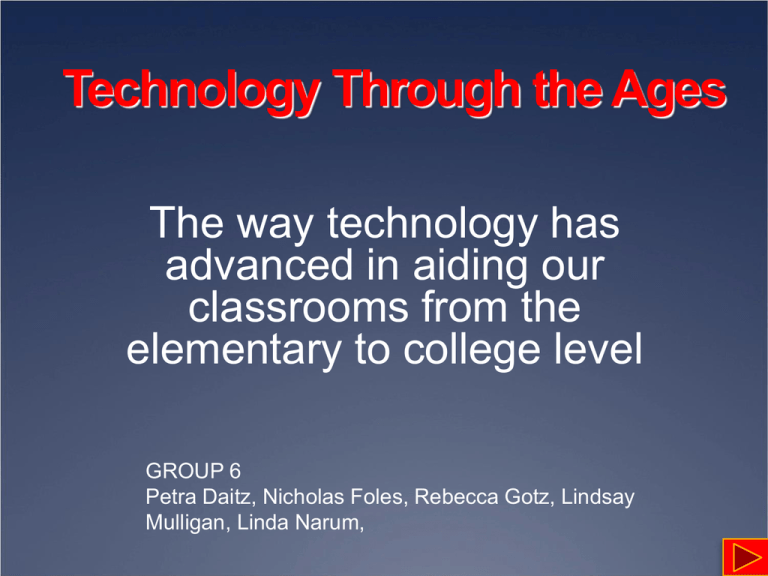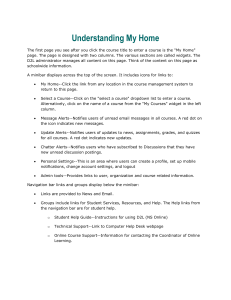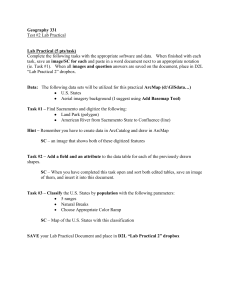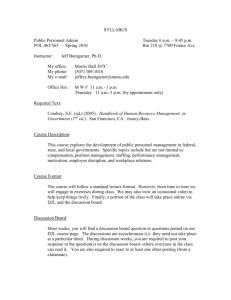Technology Through the Ages
advertisement

Technology Through the Ages The way technology has advanced in aiding our classrooms from the elementary to college level GROUP 6 Petra Daitz, Nicholas Foles, Rebecca Gotz, Lindsay Mulligan, Linda Narum, Effects of Using Technology in Elementary School When a student uses and is exposed to technology early on in their education experience, their knowledge and expertise grows and benefits them throughout their education. In classrooms today, such as the classroom of Laura Gotz at Canfield Elementary in Los Angeles, they use smart boards and laptops to enhance the knowledge of their students. Although the students are not working on these pieces of technology one on one they are being exposed to what might come later in their education. SMART BOARD A SMART board is a large whiteboard that uses touch technology for detecting user input. Such as how a mouse connected to a computer detects user input. It was invented in 1991 by SMART technologies. It is seen in many classrooms today to provide easy interactive teaching through the computer. The smart board is a screen much like an over head projector screen but has touch-screen ability. It is designed to access all of the same features a computer has plus learning exercises for certain areas such as language and mathematics. It is user friendly to all ages and makes learning fun! Technology in the Colleges Today Teachers are using technology to enhance the learning experience in many different ways. Technology is used by teachers to present information to the class in new ways, such as projectors and elmos. A major advance education is the use of programs like Desire 2 Learn(D2L) to communicate outside of the classroom. Desire 2 Learn (D2L) D2L is now being used at hundreds of college campuses as a communication tool for teachers and students. This a a program that allows teachers to create a page for each class they teach. The teacher has the ability to administer online assessments, post grades, class materials and messages for the students. D2L also gives students the opportunity to communicate with each other through the discussion board. The features of D2L allow students to constantly be interacting with their peers and teachers. Whole online classes are being administered through D2L. Twitter: What are you doing? Basics: 140 character miniblog A post is known as a “tweet” Can post comments, questions and feedback from a computer, laptop or cell phone Benefits: Group collaboration Students are much more engaged in class discussions Students can return to posts for review of material Twitter: What are you doing? High school teachers and university professors are now using Twitter in their classrooms to engage their students in learning. These education professionals have found that their students’ conversations continue outside of class when they connect class material to real-life situations. For an overview of how Twitter works and how it can be integrated into classroom activities, go to http://www.youtube.com/watch?v=xZl5GQfY6kk To see the impact that this new technology has had on students, go to: http://www.youtube.com/watch?v=4OxIz_3o3O0 http://www.youtube.com/watch?v=6WPVWDkF7U8 Information About the Elmo “Visual presenters are extremely flexible, powerful presentation tools. Unlike overhead projectors, you are not restricted to showing only flat documents or transparencies – you can display any 3D object on a computer screen, TV monitor, or through a data/video projector” (elmousa.com) Elmo P30S Digital Visual Presenter $2,990.00 Elmo Company Website: http://www.elmousa.com/index.php Distributor Website for This Model: http://www.wynit.com/products.aspx?pr oduct=1011801006 To have one of these in a classroom advances the learning of students significantly because they get a get a great image in their head of what they are learning about. It visually enhances whatever the students are learning about. It also makes it easier on the teacher when they have to teach students different materials by being very convenient and easy to operate.






